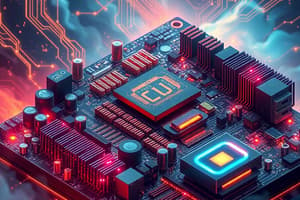Podcast
Questions and Answers
What is a system unit?
What is a system unit?
A case containing all the main parts of a computer.
Which of the following components is known as the main circuit board of the system unit?
Which of the following components is known as the main circuit board of the system unit?
- Memory
- Processor
- Motherboard (correct)
- Power Supply
What does CPU stand for?
What does CPU stand for?
Central Processing Unit
The CPU contains a control unit and an _____ logic unit.
The CPU contains a control unit and an _____ logic unit.
What is the function of registers in the CPU?
What is the function of registers in the CPU?
What controls the timing of all computer operations in the CPU?
What controls the timing of all computer operations in the CPU?
Match the following coding schemes with their meanings:
Match the following coding schemes with their meanings:
The operations performed by a CPU include controlling the reading of programs and input files.
The operations performed by a CPU include controlling the reading of programs and input files.
What does memory in a computer consist of?
What does memory in a computer consist of?
What is an expansion slot?
What is an expansion slot?
Study Notes
System Unit Overview
- The system unit, also called a "tower" or "chassis," is the main part of a desktop computer.
- It contains all essential components necessary for the computer's operation.
Components of a System Unit
-
Motherboard:
- Also referred to as the system board, is the main circuit board of the system unit.
- Hosts various electronic components and serves as the backbone for the computer.
-
Processor (Central Processing Unit - CPU):
- Interprets and executes basic instructions to operate the computer.
- Impacts the overall computing power and manages most operations within the system.
CPU Operations
- Controls reading of programs and input files.
- Processes data based on program instructions.
- Oversees creation of output results.
CPU Architecture
- Control Unit: Directs and coordinates operations performed by the computer.
- Arithmetic Logic Unit (ALU): Executes arithmetic, comparison, and logical operations.
CPU Registers
- Special storage areas within the CPU used for holding instructions, data values, and memory addresses.
- Four basic types of registers:
- Instruction Register: Holds the current instruction.
- Address Register: Stores addresses of data or the next instruction.
- Storage Register: Temporarily stores data retrieved from memory prior to processing.
- Accumulator: Stores results of arithmetic and logic operations.
System Clock
- A clock within every CPU that generates regular pulses to control timing of operations.
- Processing occurs with each "tick," determining the CPU's data processing speed.
Leading Processor Manufacturers
- Intel: Predominantly used in PCs.
- AMD (Advanced Micro Devices): Also used in PCs.
- Motorola: Common in Apple computers.
- Alpha: Utilized in workstations and high-end servers.
Data Representation in the CPU
- Utilizes a binary system where 0 represents "off" and 1 represents "on."
- Data is represented through patterns defined by coding schemas.
Popular Coding Schemas
- ASCII (American Standard Code for Information Interchange): A common coding scheme for text.
- EBCDIC (Extended Binary Coded Decimal Interchange Code): Another coding method used primarily in older systems.
Memory
- Comprises electronic components that store instructions, data needed for processing, and results of processed data.
- Usually consists of chips located on the motherboard.
Memory Storage Categories
- Store operations, application programs, and the data being processed along with resulting information.
Memory Size
- Refers to the number of bytes available for storage within memory chips or devices.
Expansion Slot and Adapter Cards
- Expansion Slot: A socket on the motherboard designed to hold adapter cards for added functionality or enhancements.
Studying That Suits You
Use AI to generate personalized quizzes and flashcards to suit your learning preferences.
Description
This quiz covers the essential components of a system unit in computer systems. Participants will explore the roles and functions of the motherboard and other vital elements of desktop computers. Ideal for anyone studying computer architecture or introductory computing concepts.




